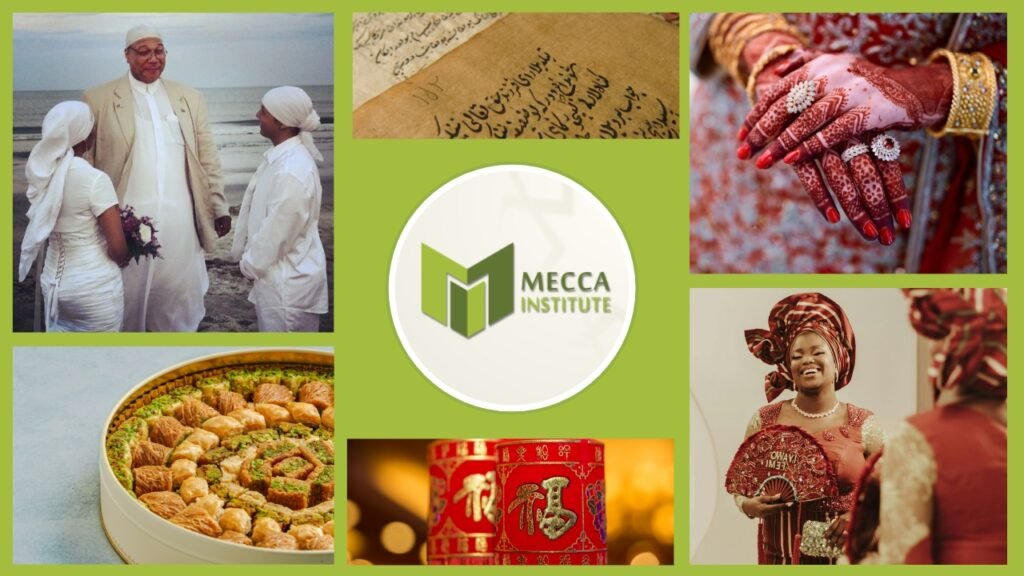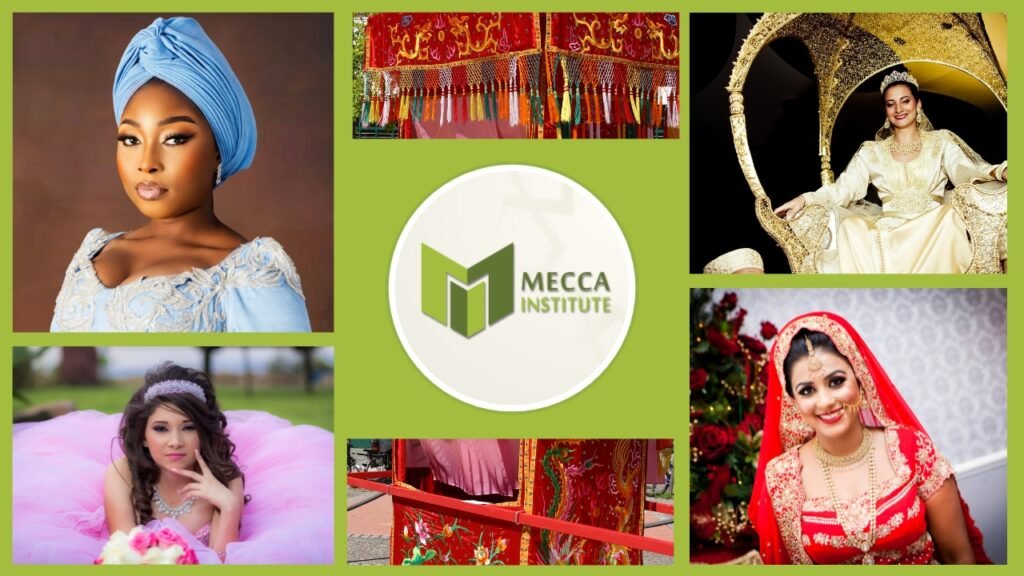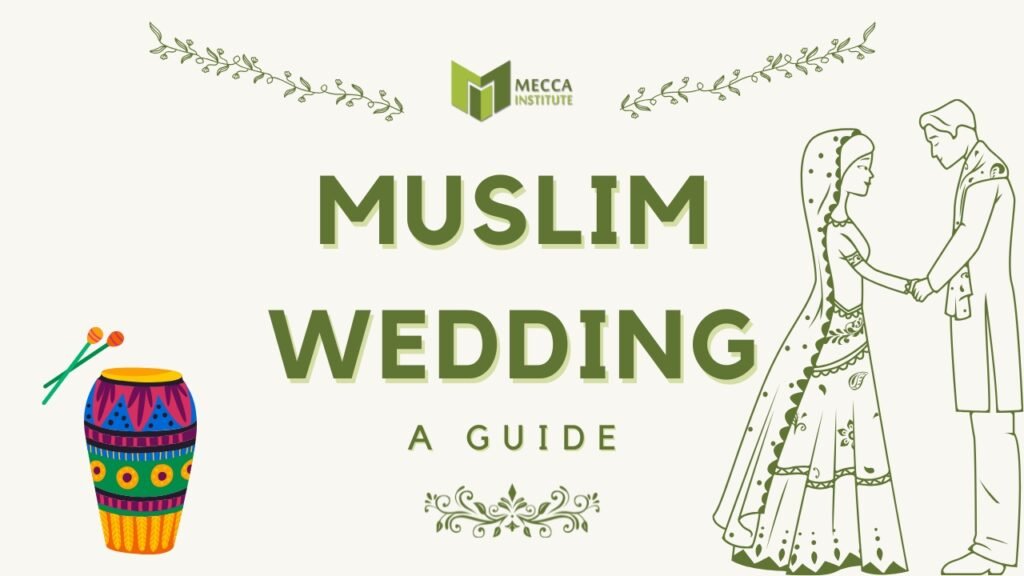Muslim wedding has multiple components, says Imam Daayiee Abdullah, including Nikah service, a reception, and cultural variations in celebrating.
As an important aspect of lifecycle for Muslims, a wedding celebrates the new beginning for two people in marriage. In most Muslim cultures, a marriage signifies a relationship beyond than the couple.
One of my privileges has been being able to officiate weddings, which I have done over 20-plus years now. I have married all kinds of couples, including non-traditional ones like members of the LGBTQ community and Muslim women marrying non-Muslims.
So, in this guide presents major topics associated with Muslim wedding, such as service, traditions, dress, and what is expected of guests, especially non-Muslims.
Islamic Wedding

An Islamic wedding is a sacred union celebrated with deep spiritual significance. Some denominations say that a marriage constitutes a half of one’s entire faith.
Progressive Muslims follow their own cultures when it comes to their traditions of their marriage. What is more important to Progressive Islam is following the law.
In the United States, for example, the law prohibits polygamy. So a man who has had an Islamic wedding once may not have more as may be the customary elsewhere.
In most Muslim denominations, a Muslim wedding starts with the nikah. The “nikah” (نِكَاح) is a contract that two people enter into, where the community is their witness. Although a few people are legally required, a celebration is usually what consititues its validity in the overall community.
Some Muslim denominations, including Sunnism, allow a “wali” (a guardian) to represent the female. As a result, a Muslim wedding is different from most other faiths in that it can only be men in a meeting.
Traditional elements of the nikah include the recitation of verses from the Quran, blessings from elders, and a festive reception with food and music.
In many cultures, the bride wears a beautiful gown or traditional attire, while the groom may don a suit or cultural garments, symbolizing joy, love, and commitment.
Muslim Wedding Service
Along with the nikah, a Muslim wedding service typically includes other celebrations. One of the important elements is the ululation.
Ululation, or “zaghruta” in Arabic (زغروتة), is a celebratory vocal expression to immediately celebrate a nikah, particularly among women. This high-pitched, wavering sound to signify that the couple is officially wed.
Another important aspect of the wedding service is the bride price or dowry. The “mahr” (مهر) is a sum of money or valuable gifts that the groom gives to the bride (or her family or overall community) as part of the marriage contract.
The mahr symbolizes respect and commitment, and it is typically an agreement that takes place before the wedding. In some cultures, the mahr is distributed immediately after nikah.
In some Muslim cultures, especially in South Asia, the female and her family actually pay a dowry. Pakistanis, for example, have the concept of “jahez” (“جہیز” in Urdu).
Many Muslim cultures also have gifting systems for the new couple as part of the wedding service. In Nigeria, Hausa couples receive gifts during their wedding ceremonies, which typically include items like fruits and kola nuts.
Muslim Wedding Traditions
Across the world, Muslim wedding traditions are as diverse as the community itself. There are diverse pre-wedding, wedding, and post-wedding traditions around the world.
Most Muslim cultures use the Islamic Calendar to plan their weddings. Some Muslims, such as some in West African, have certain pre-wedding traditions like auspicious seasons for marriage.
In Turkey, pre-wedding traditions include the “kız isteme” ceremony, where the groom formally asks the bride’s family for her hand in marriage. This is somewhat similar to Western engagement party, but it has a more formal purpose.
South Asian Muslims have diverse traditions, but a popular one is the manjha ceremony (“منجھا” in Urdu). This is similar to the Hindu haldi ceremony, where applying turmeric and sandalwood paste to the bride and groom symbolizes purification and beauty.
A popular Berber wedding tradition in North Africa is the use of the “Amaria.” This is a beautifully decorated and roofed platform on which the bride is carried into the wedding venue.
In diverse Muslim cultures, a wedding is not one day. For instance, on the second day of a Pomak wedding in Bulgaria, the bride’s family warmly hosts the guests, serving a lavish feast. The goal is to out-do the groom family’s first day.
Muslim Wedding Dress

In different cultures around the world, the Muslim wedding dress is unique. As Muslims have pre-Islamic traditions, weddings are no different.
Africa is home to a large Muslim community. In Nigeria, for example, the bride and her family may wear colorful lace or Ankara fabric. The “asoebi” may feature intricate beadwork and embroidery, with matching headscarves if required.
In East African countries like Kenya and Tanzania, brides wear kanga or kitenge. These are colorful fabrics with patterns. Designers tailor these fabrics into elegant dresses. Brides may pair these outfits with matching headscarves.
Another unique tradition is in North Africa, in Berber cultures, where brides wear a caftan. This is a gown that can be both traditional and modern. Caftan fabrics are soft and feature elaborate designs, incorporating gold or silver thread.
The majority of South Asian Muslims use the red color for brides. Red gowns symbolize joy and prosperity. Brides will wear these in long sleeves and flowing skirts, with a matching dupatta (shawl).
In Indonesia, Muslim brides typically wear a “kebaya,” a traditional dress that features a blouse with a long skirt, intricate embroidery will usually adorn it, too. Brides may also wear a “sanggul” hairstyle, with flowers and accessories, and a hijab or veil to complement their look.
Most European Muslims also have local tradtions, although the white dress has become popular in Slavic countries.
Non-Muslim Guests
Muslims around the world are in diverse cultures, including countries with large number of non-Muslims. In many cases, non-Muslims are invited as friends or even family members.
As a non-Muslim guest at a Muslim wedding, you will want to have an open mind. The cultural experience may be unique to you, but with respect and openness you will enjoy the wedding.
One of the easiest way to be respectful is to dress in a way that won’t make you stand out. Dress modestly, choosing attire that covers shoulders and knees.
Be mindful of religious practices, such as the separation of genders during certain events. Muslim weddings may not include couples dancing together, for example.
Meanwhile, participate in celebrations, but follow the lead of your hosts regarding traditions like prayer or rituals. It’s perfectly fine to be in the room, but choose to stay in the back.
Of course, you should enjoy the food, but be aware of dietary restrictions, such as halal options, especially if you decide to bring something.
Also, engage with guests in a friendly manner according to the culture, but avoid sensitive topics related to religion. You may also choose to not discuss politics, just in case.
Most importantly, express gratitude for the invitation and the opportunity to witness a beautiful cultural event. The couple will be happy if you can acknowledge their parents, for example.
Conclusion
For Muslims, a wedding is a sacred union that symbolizes the bond between spouses under Islamic principles. It is a celebration of love, commitment, and family, and it comes with a community support and shared values.
The ceremony includes religious rituals, reinforcing faith and the importance of companionship in life’s journey, as well as cultural traditions that make the experience memorable.
For most cultures, this rite of passage celebrates traditions and creates memories to cherish and stronger bonds that last a lifetime.
May Allah continue to bless us all.
Imam Daayiee Abdullah is the Executive Director of MECCA Institute and the author of “Progressive Islam,” a historic book that defines Progressive Islam.


Pingback: Muslim Desserts Guide for the Most Amazing Global Treats